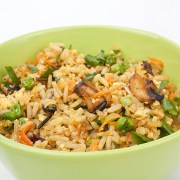 Photo: Getty Images
Photo: Getty Images
With a history of colon cancer in my family, I am naturally drawn to any information about preventive measures through diet.
A recent study from Loma Linda University in California spells out the advice pretty simply: eat legumes and brown rice. That means more beans and lentils -- in soups, salads, casseroles and chili -- and more peas, which is my least favorite vegetable.
I am not so crazy about brown rice either, but the study makes a convincing case for learning to like all these foods.
Eating legumes at least three times a week and eating brown rice at least once a week have been shown to reduce the risk of colon polyps by 33 percent and 40 percent, respectively, according to a July 28, 2011, Loma Linda University School of Public Health media release.
Cooked green vegetables and dried fruit also were linked to protective benefits, said Loma Linda researchers, who published their work in the May 2011 issue of Nutrition and Cancer.
Colon polyps set off an alarm whenever doctors find them during colonoscopies because they sometimes lead to colon or colorectal cancer. Colon cancer is the second-leading cause of cancer deaths in the United States and the third most common form of cancer when grouping men and women, according to the American Cancer Society.
As medical experts often note, your diet can play a huge role in your susceptibility to cancer.
“While a majority of past research has focused on broad food groups, such as fruits and vegetables, in relation to colon cancer, our study focused on specific foods, as well as more narrowed food groups, in relation to colon polyps, a precursor to colon cancer. Our study confirms the results of past studies that have been done in different populations analyzing risks for colon cancer,” said Dr. Yessenia Tantamango, lead author of the study and a postdoctoral research fellow for Loma Linda’s Adventist Health Studies.
Beyond legumes and brown rice, the research revealed cancer-fighting benefits when subjects ate cooked green vegetables once a day or more and dried fruit three times a week or more. Consumption at that rate cut the risk of rectal/colon polyps by 24 percent and 26 percent, respectively.
The high fiber content in legumes, brown rice and dried fruit helps dilute potential carcinogens, and green vegetables such as broccoli contain a detoxifying compound, Tantamango explained.
The research looked at data from 2,818 people, surveyed about their eating habits in 1976-77 and again 26 years later when researchers inquired about the results of their colonoscopies. The study adjusted for factors such as family history of colorectal cancer, physical activity, constipation, alcohol intake and smoking, as well as variables in diet.
Dr. Andrew Weil, a nationally known wellness expert and developer of the Anti-Inflammatory Diet, said in his weekly newsletter of Aug. 11, 2011, that he welcomes more support through research of dietary strategies that help prevent colon polyps and colon cancer.
He also reminded readers that avoiding red meat can reduce the risk of polyps and colon cancer, as can limiting alcohol intake.
So you might be able to guess what I’m making for dinner tonight: vegetarian chili with three varieties of beans, along with lentils. No peas, not yet.
Sources:
Frehn, Jennifer. “Cooked green vegetables, dried fruit, legumes, and brown rice may decrease risk of colon cancer.” Adventist Health Studies, Loma Linda University School of Public Health. Web. 3 Oct. 2011.
http://www.llu.edu/public-health/health/polyps.page
“Promoting Colon Health.” Weekly Bulletin (8/11/11), DrWeil.com. Web. 3 Oct. 2011.
http://www.drweil.com/drw/u/WBL02259/These-Foods-May-Promote-Colon-Health.html
Reviewed October 3, 2011
by Michele Blacksberg RN
Edited by Jody Smith






Add a CommentComments
There are no comments yet. Be the first one and get the conversation started!